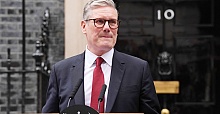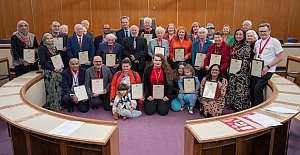The ‘Supreme’, but unelected Leader of the Iranian theocracy, Ayatollah Seyyed Ali Khamenei, has said that Iran will not halt its nuclear research and development program. Speaking during a meeting with a number of Iranian nuclear officials and experts held in Tehran recently, Ayatollah Khamenei stated that “Consent was given to the nuclear talks in order to break up the hostile atmosphere created by the ‘hegemonistical’(sic) front against Iran, but all people should be aware that despite the fact that the talks will continue, the Islamic Republic of Iran will not halt its activities with regard to nuclear research and development.”
The religious head also said that the Islamic Republic will not abandon any of its nuclear achievements, adding that the relations between Iran and the International Atomic Energy Agency must be “conventional”, adding that “No one is allowed to compromise on (the country’s nuclear achievements) and no one will do so.” Elsewhere in his remarks, the Leader said that the talks between Tehran and the major powers must continue and that the subject of the talks must only be the nuclear issue and that Iranian nuclear negotiators must not give in to unreasonable demands.
After two days of talks in Vienna which ended on Wednesday 9th April, negotiators from Iran and the six world powers have agreed to meet again on May 13 to continue talks on the Iranian nuclear issue in the Austrian capital.
The talks are aimed at paving the way for drafting a compressive nuclear deal between Iran and the major powers known as the 5+1 group (the five permanent members of the UN Security Council plus Germany).
In a joint press conference with European Union foreign policy chief Catherine Ashton who represents the powers, Iranian Foreign Minister Mohammad Javad Zarif said that serious efforts are required to address the differences between the two sides.
The Vienna talks are meant to build on an interim deal reached between Iran and the 5+1 group in Geneva on November 2013, according to which Iran agreed not to expand its nuclear program for six months in exchange for limited sanctions relief.
In a separate news conference with Iranian journalists and covered by both English language and Iranian media, Minister Zarif said, “Our partners could depict an absolutely clear and realistic picture of Iran’s peaceful nuclear program and we feel that many of the misunderstandings and concerns can be alleviated.” He added that any decision should be based on mutual interests and in compliance with the Joint Plan of Action, which is mutually agreed upon.
In the meantime, Iran is implementing last year’s interim nuclear deal with the six major powers as planned almost three months after the accord took effect. The International Atomic Energy Agency (IAEA) is tasked with checking that Iran is complying with the terms of the November 24 agreement, under which Tehran agreed to scale down its nuclear program for six months in exchange for some sanctions easing.
Iran is determined to develop nuclear technology for the production of energy. There are concerns, to greatly understate, particularly in Israel that the true ambition of the Iranian leadership is to become a nuclear armed power. Israel themselves are so equipped although this has never been officially admitted. But it is widely thought that not only does Israel have some 208 nuclear warheads in her arsenal; indeed former U.S. President Jimmy Carter suggests that Israel has at least 300 nuclear warheads! Should they run out their patrons – the USA – will supply them with a few more!
Iran has been subjected to decades of sanctions, some of which have been inhumane. Yet despite these, great technological advances have been made in that country. Surely if it is fine enough for certain countries to possess nuclear technology, why should these then deny the right for other countries to develop the same technology for energy production? Well, Iran’s cause was not really helped by the emeritus president, Mahmoud Ahmadinejad who openly called for the destruction of Israel! It is therefore to be hoped that the present management can sufficiently reassure the rest of the world of the probity of their energy ambitions and to cooperate with procedures to ensure precisely that. Thereafter, let Iran be embraced into the rest of the global economy without sanctions.


 Prime Minister Keir Starmer's 2025 Easter message
Prime Minister Keir Starmer's 2025 Easter message After Nesil Caliskan a by-election will be held in Jubilee ward in Enfield
After Nesil Caliskan a by-election will be held in Jubilee ward in Enfield Publishing the analysis, Labour’s Cllr Ergin Erbil said Everybody in Enfield deserves basic rights
Publishing the analysis, Labour’s Cllr Ergin Erbil said Everybody in Enfield deserves basic rights Gaza-Israel conflict Statement from Cllr Ergin Erbil, Leader of Enfield Council
Gaza-Israel conflict Statement from Cllr Ergin Erbil, Leader of Enfield Council The European Union called on Turkey to uphold democratic values
The European Union called on Turkey to uphold democratic values Turkish citizens in London said Rights, Law, Justice
Turkish citizens in London said Rights, Law, Justice The Council of Turkish Cypriot Associations Geneva response letter
The Council of Turkish Cypriot Associations Geneva response letter Sustainable Development and ESG, Will This Become the Course for Turkic World
Sustainable Development and ESG, Will This Become the Course for Turkic World The 'Prince of Paris' has impressed in his first EuroLeague season
The 'Prince of Paris' has impressed in his first EuroLeague season Saran Media And Euroleague Basketball Extend Media Rights Partnership for Four More Years
Saran Media And Euroleague Basketball Extend Media Rights Partnership for Four More Years Will Rangers be Jose Mourinho’s next victim?
Will Rangers be Jose Mourinho’s next victim? Jose Mourinho's Fenerbahce face Rangers on Thursday
Jose Mourinho's Fenerbahce face Rangers on Thursday Barclays has become the biggest UK lender so far to cut mortgage rates
Barclays has become the biggest UK lender so far to cut mortgage rates THE SPRING STATEMENT EXPLAINED, UK ECONOMIC OUTLOOK AND GROWTH FORECASTS
THE SPRING STATEMENT EXPLAINED, UK ECONOMIC OUTLOOK AND GROWTH FORECASTS Launch of Made in Enfield gift shop to celebrate local artists and designers
Launch of Made in Enfield gift shop to celebrate local artists and designers Trial used smart Wi-Fi sensors for live building occupancy data to optimise
Trial used smart Wi-Fi sensors for live building occupancy data to optimise
















